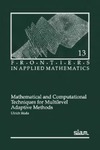Multilevel adaptive methods play an increasingly important role in the solution of many scientific and engineering problems. Fast adaptive methods techniques are widely used by specialists to execute and analyze simulation and optimization problems. This monograph presents a unified approach to adaptive methods, addressing their mathematical theory, efficient algorithms, and flexible data structures.
R?de introduces a well-founded mathematical theory that leads to intelligent, adaptive algorithms, and suggests advanced software techniques. This new kind of multigrid theory supports the so-called "BPX" and "multilevel Schwarz" methods, and leads to the discovery of faster more robust algorithms. These techniques are deeply rooted in the theory of function spaces. Mathematical and Computational Techniques for Multilevel Adaptive Methods examines this development together with its implications for relevant algorithms for adaptive PDE methods. The author shows how abstract data types and object-oriented programming can be used for improved implementation.
Special Features
- theory of multilevel (including additive) methods based on concepts in approximation theory and the theory of function spaces
- fully adaptive multigrid, based on the "virtual global grid" refinement technique and the "multilevel adaptive relaxation" algorithm
- implementation aspects of adaptive mesh data structures in view of object-oriented programming (C++)
 |
|
О проекте
|
|
О проекте


